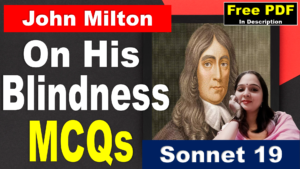Naryal Purnima Poem by Gieve Patel | Naryal Purnima | Gieve Patel | Explanation | Summary | Key Points | Word Meaning | Questions Answers | Critical Appreciation | Themes | Free PDF Download – Easy Literary Lessons
Naryal Purnima
They say the seas change mood today.
Pronounce an official end to the rains
And this year they did – the generous
Curtain shrank upward
For once according to the calendar
To ignore our need: a month
Of deluge and then these brilliant
Beautiful days of drought.
Naryal Purnima should be a few days’ halt
Before the second rains begin; the rice
Sprouted, transplanted, yet doomed to die
Without a new month’s grace of extra water.
The first rains bore fruit, I’m told.
The country pushed root, prepared to fling
An arc of branches; yet I know nothing today
Of feeling or intellect that condensed to form
Nineteenth-century grain.
Only a faded haze remains
Over academic portraits in public buildings:
Gentle beards a trifle unreal, patriotic songs
And as Chaudhuri explains.
A well-meaning spider weaving us
Into a maze. The disciple turned once
To share a joke. A camera clicked. And
Our calendars repeat the image to exhaustion.
Reaching perhaps
For the ambiguous implication.
Marine Drive is sharp. I can see
Each wavelet like a chip of cut-glass and
Almost all the leaves on Malabar Hill. I sit,
Non-conformist, facing the sea, my back set
To the rich and the less rich as they come
Scrubbed and bathed, carrying a dirty little satchel
With a nut for the gods, Had I the will to trouble
I’d be with the others the driftwood
From the South, poised black and lean
Against a blinking sea
Their minds profanely focused
On the wave-pitched gifts.
Do I sympathize merely with the underdog?
Is it one more halt in the search for ‘identity’?
Our interiors never could remain
Quite English. The local gods hidden in
Cupboards from rational Parsi eyes
Would suddenly turn up on the walls
Garlanded alongside the King and the Queen.
And the rulers who had such praise for our manners
Disappeared one day. So look instead at something else:
Even accept and belong. Grit teeth and recite:
“This is the poet’s land. The sun’s blinding life.
The ear-splitting pipes penetrate the soul.
The petty glare may be counterpart.
The round rain-clouds, the soft thick thunder,
Set loose the fat and the oil. Love one
Love the other.” But there’s effort involved.
Today it is simpler to admit with relief:
The men are too greasy, their speech
Is too nasal, their wives either plain
Or overdone; they choose for their dresses
A shattering blue and choke their flowers
In tinsel; their mind is provincial.
Their children are dull. And a relief to turn
From these suppliants to the urchins.
Their meagre flesh etching a problem
Perhaps not of the mind, their hunger present
As a common factor, ground of dark rest
From twenty doubts, indisputable birth-mark
To recognize
Myself and the country by.
For a moment I forget to think:
‘Eternally ignorant, stranded through ages.,
Pesky beggars unwilling to work,
Their language a pointless gargle,
Their skin dirty and dark.’
Hear me instead apostrophize:
‘As you stand half-naked on the walls
and wait for coconuts to strike the sea,
And pose intent and ready to dive in
Before they be borne too far out of reach,
There could be cynicism at least
On your faces, if not accusation, as I sit
Casual commentator, but surely not this
Innocuous smile at my interest?’
The urchins strip to plunge.
The oily ones are startled. The men
Look flustered, imperiously order them
Away; the women squawk in their sharp
Brittle clothes. But the drifters stay:
As coconuts are tossed and touch water
My present identities dive, snatch libations
From under god’s nose.
The rains may truly fail this year.
Our prayers may go unheard.
Naryal Purnima by Gieve Patel: YouTube Link
Naryal Purnima Poem Analysis
They say the seas change mood today.
Pronounce an official end to the rains
And this year they did – the generous
Curtain shrank upward
For once according to the calendar
To ignore our need: a month
Of deluge and then these brilliant
Beautiful days of drought.
Naryal Purnima should be a few days’ halt
Before the second rains begin; the rice
Sprouted, transplanted, yet doomed to die
Without a new month’s grace of extra water.
Reference to Context:
This stanza is part of Naryal Purnima, a poem by Gieve Patel, in which the poet reflects on the end of the monsoon season, the festival of Naryal Purnima, and the human dependency on nature, particularly rain, for survival. The poem uses the changing moods of nature, such as the rains and the dry season, to explore the fragile relationship between humans and the environment. The speaker reflects on the passing of time and the uncertainty faced by those who depend on agriculture.
Explanation:
“They say the seas change mood today.”
The speaker starts by saying that “they” (perhaps referring to local beliefs or weather experts) say that the sea is “changing mood” today. This phrase uses the sea as a metaphor for nature, indicating a shift or change in the weather. The “mood” of the sea represents the changing of seasons, particularly the transition from the monsoon (rainy season) to the dry season.
“Pronounce an official end to the rains”
This line refers to the formal announcement or acknowledgment that the rains have officially ended. In many places, the end of the monsoon is marked by cultural events, festivals, or signs in nature that signal the arrival of a dry period. The rains that nourish the land are now over, leaving behind a time of drought.
“And this year they did – the generous / Curtain shrank upward”
The speaker reflects that, this year, the end of the rains came right on time. The rains are called “generous” because they provided life-giving water, but now, the “curtain shrank upward,” signaling that the rain season is coming to a close. The “curtain” is a metaphor for the end of the rainy period, much like the closing of a theater performance.
“For once according to the calendar”
The speaker notes that, for once, the rains ended exactly when they were expected to, according to the traditional calendar. In the past, the timing of the rains might have been unpredictable, but this year, nature is following its usual course. The rains are ending on schedule, as expected by the calendar.
“To ignore our need: a month / Of deluge and then these brilliant / Beautiful days of drought.”
The speaker expresses a sense of frustration that, although nature follows its own schedule, it ignores the human need for consistent rainfall. After a month of “deluge” (heavy, continuous rain), the dry season begins. The “brilliant” and “beautiful” days of drought are described in an ironic way — they are clear and sunny, but the lack of rain makes them harmful, especially for crops that depend on water. The “brilliant” days look nice, but they bring the hardship of a drought.
“Naryal Purnima should be a few days’ halt / Before the second rains begin;”
Naryal Purnima is a festival that marks the end of the first monsoon rains and the beginning of the dry period. It is supposed to be a brief pause or “halt” before the second round of rains arrives. However, the speaker hints at uncertainty — the second rains may not come soon enough to help the crops or fulfill the land’s needs.
“The rice / Sprouted, transplanted, yet doomed to die / Without a new month’s grace of extra water.”
The speaker focuses on the rice crops, which have sprouted and been transplanted (moved to new fields), but are at risk of dying if they do not receive enough water in the coming month. Rice needs a lot of water to grow, and without the “grace of extra water” (meaning enough rain), the crops will fail. This shows the vulnerability of agriculture, as the crops depend on timely and adequate rainfall.
Poetic devices:
Personification: The sea is personified as having a “mood” that changes. This human quality adds a sense of dynamism and unpredictability to nature.
Imagery: Vivid imagery is used to describe the monsoon season, such as “a month of deluge” and “brilliant beautiful days of drought.” These phrases evoke contrasting visuals of abundance and barrenness.
Symbolism: The monsoon rain symbolizes life and sustenance, while the drought represents fragility and death.
“Naryal Purnima” serves as a cultural symbol of harmony between human activities and natural cycles.
Alliteration: The repetition of consonant sounds in phrases like “brilliant beautiful days of drought” enhances the rhythm and emphasizes the contrasting imagery.
Contrast: The poet juxtaposes “deluge” with “drought” to highlight the extremes of nature’s behavior.
Irony: The rains retreat “according to the calendar” but ignore human needs, illustrating the ironic gap between human expectations and nature’s indifference.
Metaphor: “Curtain shrank upward” serves as a metaphor for the departure of the rains, comparing it to the closing of a stage performance.
Enjambment: The lines flow into each other without pauses, mimicking the continuity of natural processes and human concerns.
The first rains bore fruit, I’m told.
The country pushed root, prepared to fling
An arc of branches; yet I know nothing today
Of feeling or intellect that condensed to form
Nineteenth-century grain.
Only a faded haze remains
Over academic portraits in public buildings:
Gentle beards a trifle unreal, patriotic songs
And as Chaudhuri explains.
A well-meaning spider weaving us
Into a maze. The disciple turned once
To share a joke. A camera clicked. And
Our calendars repeat the image to exhaustion.
Reaching perhaps
For the ambiguous implication.
Reference to Context:
This stanza is a reflection on the connection between the past and present in Gieve Patel’s poem Naryal Purnima. It focuses on the speaker’s disillusionment with the intellectual and cultural legacies of the past, and how these legacies, represented through academic ideas and portraits, are often reduced to mere symbols that lose their meaning over time. The poem contrasts the natural cycle of the rains with the intellectual and social cycles of human history, highlighting the disconnection between the idealized past and the present reality.
Explanation:
“The first rains bore fruit, I’m told.”
The speaker begins by acknowledging that they have heard (but perhaps haven’t experienced directly) that the first rains of the season brought fruitful results. This could refer to the literal agricultural harvest that follows the arrival of the rains, or it could be metaphorical, suggesting that the “first rains” (perhaps new ideas or beginnings) led to some positive results. The phrase “I’m told” suggests the speaker is reflecting on second-hand knowledge or hearsay, rather than personal experience.
“The country pushed root, prepared to fling / An arc of branches;”
This line continues the metaphor of growth, where the country (or society) is compared to a plant. The country is “pushing root,” meaning it is putting down its foundation, while also “preparing to fling an arc of branches,” symbolizing the potential for expansion, growth, or progress. The arc of branches could represent the spread of ideas or developments that might come in the future. The metaphor suggests that there is energy and growth, but it is still in its early stages, awaiting further development.
“yet I know nothing today / Of feeling or intellect that condensed to form / Nineteenth-century grain.”
The speaker then reflects on their disconnection from the past. They admit that they do not understand or relate to the “feeling or intellect” of the past, specifically from the 19th century. “Condensed to form” refers to how ideas or knowledge from the past have been crystallized into what we now know as intellectual heritage. The speaker is saying that they do not grasp or feel connected to the ideas, values, or knowledge that shaped the intellectual and cultural world of the 19th century.
“Only a faded haze remains / Over academic portraits in public buildings:”
The speaker then describes the legacy of the past as a “faded haze,” meaning that the ideas and intellectual contributions of the past have lost their clarity and are now distant and unclear. The “academic portraits in public buildings” symbolize the intellectual figures and leaders of the past whose images are still preserved in places like schools, universities, or government buildings. But these portraits, and by extension the ideas they represent, have faded in significance over time, becoming more of a symbol than a living influence.
“Gentle beards a trifle unreal, patriotic songs”
The “gentle beards” could refer to idealized, almost mythical representations of intellectuals or leaders from the past, who are now seen as somewhat “unreal” or distant. These figures are no longer seen as living, breathing people with complex ideas, but rather as symbols of a time that is hard to relate to. “Patriotic songs” evoke national pride, but like the “gentle beards,” they have become stale or disconnected from the present moment. The speaker implies that the songs and symbols of patriotism from the past no longer feel relevant or meaningful.
“And as Chaudhuri explains.”
The mention of “Chaudhuri” likely refers to a thinker or scholar (possibly a reference to a specific intellectual, such as the Indian author, Nirad C. Chaudhuri), whose ideas or interpretations are being invoked. The speaker notes that Chaudhuri (or another intellectual figure) tries to explain the past or its significance, but the speaker remains disconnected from it, as if the explanations are not enough to bridge the gap between the past and present.
“A well-meaning spider weaving us / Into a maze.”
The metaphor of a “well-meaning spider” suggests that intellectual systems, cultural ideologies, or societal norms have created a complex web (the “maze”) that people are trapped in. The “well-meaning” part implies that these systems or traditions were created with good intentions, but over time, they have led to confusion or entanglement. The maze represents the complexity and difficulty of navigating through inherited knowledge or cultural expectations that may no longer serve the current generation effectively.
“The disciple turned once / To share a joke. A camera clicked.”
The “disciple” refers to someone who follows or learns from a teacher or intellectual figure. The disciple turns “once” (perhaps metaphorically) to share a joke, suggesting a moment of lightheartedness in the midst of intellectual or academic seriousness. The “camera clicked” suggests that this moment was captured, maybe symbolizing how such moments are frozen in time and recorded, but ultimately, they don’t change or evolve. The photograph is a representation of a moment that no longer feels immediate or alive.
“And our calendars repeat the image to exhaustion.”
The “calendars” repeating the image refers to how society continues to remember and celebrate the past — whether through portraits, songs, or rituals. However, the speaker suggests that this repetition has become tiresome, like a recurring event that no longer brings new meaning. The image of the past is repeated “to exhaustion,” implying that society is stuck in a cycle of looking back without progressing or evolving.
“Reaching perhaps / For the ambiguous implication.”
In the final lines, the speaker suggests that there may be an “ambiguous implication” in all of this — a deeper or hidden meaning behind the repetition of past symbols and traditions. However, this implication is unclear or uncertain, leaving the speaker to question whether the repetition of these images (intellectual portraits, patriotic songs, etc.) has any real purpose or meaning anymore. The “ambiguity” reflects the speaker’s uncertainty about the value of these traditions in the present day.
Poetic Device:
Metaphor: “The country pushed root, prepared to fling / An arc of branches” metaphorically describes agricultural and cultural growth enabled by the rains.
“A well-meaning spider weaving us into a maze” symbolizes the tangled and often confusing interpretation of history.
Imagery: Phrases like “faded haze” and “gentle beards a trifle unreal” create vivid mental pictures of forgotten or idealized history.
Irony: The stanza critiques how history, once vital and profound, is now reduced to lifeless portraits and overused calendar images.
Allusion: Reference to Chaudhuri adds depth, connecting the poem to broader literary and intellectual discussions about Indian identity and colonial legacy.
Personification: The “well-meaning spider” personifies the idea of history or cultural memory, suggesting a conscious but flawed effort to connect people with their past.
Symbolism: “Nineteenth-century grain” symbolizes both agricultural success and intellectual achievements of a historical period, now seemingly irrelevant.
Enjambment: The lines flow into each other, mimicking the layered and continuous nature of historical interpretation.
Marine Drive is sharp. I can see
Each wavelet like a chip of cut-glass and
Almost all the leaves on Malabar Hill. I sit,
Non-conformist, facing the sea, my back set
To the rich and the less rich as they come
Scrubbed and bathed, carrying a dirty little satchel
With a nut for the gods, Had I the will to trouble
I’d be with the others the driftwood
From the South, poised black and lean
Against a blinking sea
Their minds profanely focused
On the wave-pitched gifts.
Do I sympathize merely with the underdog?
Is it one more halt in the search for ‘identity’?
Reference to Context:
In this stanza from Naryal Purnima, Gieve Patel reflects on the social divisions and his personal disconnection from both the wealthy and the poor. The speaker observes the contrast between the rich and the less privileged while sitting on Marine Drive, a prominent area in Mumbai. The image of “driftwood from the South” adds a layer of commentary on social and cultural identity, and the speaker questions whether his sympathy for the underprivileged is genuine or merely a part of his search for personal meaning and “identity.” Through these reflections, Patel explores the complexities of social class and the individual’s role within it.
Explanation:
“Marine Drive is sharp. I can see / Each wavelet like a chip of cut-glass and / Almost all the leaves on Malabar Hill.”
The speaker describes Marine Drive, a well-known road along the coast in Mumbai, as “sharp,” meaning it is clear and sharply defined, with a sharp view of the surrounding area. From where the speaker is sitting, they can see “each wavelet” (small waves on the sea) that looks like a “chip of cut-glass,” implying that the water is clear and glistening, almost like pieces of glass. The speaker also mentions being able to see “almost all the leaves on Malabar Hill,” which suggests that the view is expansive, indicating that the speaker is in a position of observation, taking in the sights of both the sea and the city.
“I sit, / Non-conformist, facing the sea, my back set / To the rich and the less rich as they come / Scrubbed and bathed, carrying a dirty little satchel / With a nut for the gods,”
The speaker positions themselves as a “non-conformist,” someone who does not follow the mainstream or typical societal norms. They are “facing the sea,” symbolizing perhaps a desire for solitude or introspection, while their back is turned to the people around them. These people represent different social classes, described as “the rich and the less rich.” The phrase “scrubbed and bathed” suggests that these people are clean and presentable, yet they carry with them “a dirty little satchel,” perhaps symbolizing their burdens, struggles, or social class. The “nut for the gods” could refer to a small offering or gesture of devotion, symbolizing their attempt to seek blessings or favor, but it also highlights their material needs and efforts for spiritual satisfaction.
“Had I the will to trouble / I’d be with the others the driftwood / From the South, poised black and lean / Against a blinking sea”
The speaker imagines that if they had the “will to trouble” (the motivation or desire to engage), they could be like “the others,” possibly the poor or marginalized people, symbolized by “driftwood.” Driftwood is often washed up on the shore, aimless and directionless, representing people who are disconnected or displaced, particularly from the South (possibly referring to the lower classes or the working class). The image of “poised black and lean / Against a blinking sea” suggests that these people are standing firm against the challenges of life, against the vast and unpredictable “blinking sea,” which might represent the harshness of the environment or society.
“Their minds profanely focused / On the wave-pitched gifts.”
The “minds” of the driftwood people (the poor, perhaps) are described as “profanely focused,” meaning they are intensely focused on the “wave-pitched gifts,” which could refer to small offerings or rewards from the sea. These gifts may symbolize the material goods or opportunities that come their way, which they pursue with single-minded focus. The use of the word “profanely” suggests that these people are driven by material desires or survival instincts, which contrasts with the more abstract or philosophical concerns the speaker may have.
“Do I sympathize merely with the underdog? / Is it one more halt in the search for ‘identity’?”
The speaker questions their own motivations. Do they feel sympathy for the underdog (the marginalized, poor people) simply because they are an “underdog,” or is their concern for these people more about their own search for meaning or “identity”? The question suggests that the speaker may feel disconnected from both the rich and the poor, and they wonder if their sympathy for the underprivileged is sincere or merely an intellectual or emotional exercise — a way to find purpose or identity in a society where they feel somewhat alienated.
Poetic Device:
Imagery: The “wavelet like a chip of cut-glass” and the view of “almost all the leaves on Malabar Hill” create vivid, precise pictures of the setting.
The description of the “dirty little satchel” and “poised black and lean” driftwood evokes strong contrasts between the ritualistic and the marginalized.
Symbolism: “Marine Drive” and “Malabar Hill” symbolize the intersection of nature and urban life, as well as the societal contrasts in Mumbai.
The “nut for the gods” represents religious offerings and, metaphorically, the human attempt to connect with divine powers.
Juxtaposition: The wealthy and less wealthy are placed side by side, united in their rituals but divided in their circumstances.
The sacred (coconut offerings) is contrasted with the profane (drifters retrieving them for survival).
Rhetorical Question: The poet asks, “Do I sympathize merely with the underdog?” to question the authenticity of his feelings and motivations.
Metaphor: The “driftwood from the South” metaphorically represents marginalized people, adrift and surviving on the fringes of society.
Enjambment: The lines flow seamlessly, mirroring the continuous interplay of thoughts in the poet’s mind.
Our interiors never could remain
Quite English. The local gods hidden in
Cupboards from rational Parsi eyes
Would suddenly turn up on the walls
Garlanded alongside the King and the Queen.
And the rulers who had such praise for our manners
Disappeared one day. So look instead at something else:
Even accept and belong. Grit teeth and recite:
“This is the poet’s land. The sun’s blinding life.
The ear-splitting pipes penetrate the soul.
The petty glare may be counterpart.
The round rain-clouds, the soft thick thunder,
Reference to Context:
In this stanza from Naryal Purnima, Gieve Patel reflects on the blending of cultures in India, particularly the tension between British colonial influences and local traditions. The speaker observes how the English influence in their interiors (homes, spaces) could never fully replace the local, traditional elements. The local gods, often hidden from the rational eyes of the British (or perhaps other Westernized elites), eventually make their presence felt again in the form of garlands and decorations. This blending of cultures is juxtaposed with the disillusionment with colonial rule and the passing of the rulers who once praised their manners. The speaker then shifts to the idea of acceptance and belonging in a place that feels both familiar and foreign, with the final lines invoking the powerful forces of nature as symbols of life and the poet’s land.
Explanation:
“Our interiors never could remain / Quite English.”
The speaker begins by reflecting on how their home or interior life (the space they live in) could never fully conform to “English” (Western or colonial) standards. Despite British influences or colonial rule, something about the local culture, traditions, and identity couldn’t be erased or replaced. The phrase “never could remain quite English” shows how colonial efforts to impose English customs and ways of life were never completely successful in changing the essence of local life.
“The local gods hidden in / Cupboards from rational Parsi eyes”
This line highlights the tension between Western rationalism (symbolized by “rational Parsi eyes”) and local religious or spiritual practices. The “local gods” refer to Hindu deities or figures from local religions that were often marginalized or hidden from the colonial or rational mindset of the time. The Parsi community, which is known for its rationalist and modern approach to life, represents those who might have kept these local gods “hidden” or disregarded them in favor of Western ideals.
“Would suddenly turn up on the walls / Garlanded alongside the King and the Queen.”
Despite efforts to hide or suppress local beliefs, the “local gods” eventually make their presence felt again. They “suddenly turn up on the walls,” meaning that they are displayed openly, often alongside portraits of the British rulers (the King and Queen). This represents the blending of the colonial rulers’ presence with the local religious and cultural elements. The gods are “garlanded,” which suggests a reverent display, contrasting the Western formality with the more vibrant, traditional expressions of local faith.
“And the rulers who had such praise for our manners / Disappeared one day.”
The British rulers, who once praised the “manners” of the colonized people (perhaps their politeness, cultural practices, or ability to adapt to British norms), are no longer in power. This is a reference to India’s independence from British colonial rule. The phrase “disappeared one day” marks the end of colonial dominance and the passing of the rulers who once held authority over the country.
“So look instead at something else: / Even accept and belong.”
With the disappearance of the British rulers and the end of colonial rule, the speaker urges the people to look at something else — to shift their focus from the colonial past to something more indigenous and authentic. The phrase “Even accept and belong” suggests that, in the wake of independence, it is important for people to embrace their own culture, traditions, and identity, despite the long history of foreign influence.
“Grit teeth and recite: / ‘This is the poet’s land. The sun’s blinding life.'”
The speaker seems to acknowledge the struggle that comes with this acceptance, suggesting that it might not be easy. “Grit teeth” implies that it may take effort or even discomfort to embrace one’s identity in the face of historical challenges. The lines “This is the poet’s land” and “The sun’s blinding life” celebrate the land of the poet (perhaps India), which is full of vitality, warmth, and life. The sun is described as “blinding” because it is powerful, overwhelming, and inescapable, much like the intense cultural and spiritual presence of the land.
“The ear-splitting pipes penetrate the soul.”
The “ear-splitting pipes” could refer to loud, intrusive sounds in the environment (perhaps the sounds of religious ceremonies, street vendors, or the bustle of urban life). These sounds “penetrate the soul,” meaning they have a deep, almost spiritual effect on the people who live there. The noise might be overwhelming, but it also connects people to their land, culture, and identity, emphasizing the richness of life that exists in India.
“The petty glare may be counterpart.”
“Petty glare” refers to the distractions or irritations in life that may seem insignificant or frustrating but are a natural part of existence. The “petty glare” could symbolize the challenges and complexities of daily life, whether they are political, social, or personal. The “counterpart” suggests that these small irritations are a necessary part of the larger picture, balancing out the intensity of life.
“The round rain-clouds, the soft thick thunder,”
The imagery of “round rain-clouds” and “soft thick thunder” brings to mind the monsoon season, a powerful and vital time for India. The rain and thunder are “soft” and “thick,” perhaps symbolizing the rich, nourishing forces of nature that shape the land. The monsoon is often seen as both a challenge and a blessing, bringing the much-needed water to the land but also causing disruption.
Poetic Device:
Symbolism: “Local gods” represent indigenous beliefs and traditions suppressed but not extinguished by colonial influence.
The “King and Queen” symbolize British colonial rulers, whose images linger alongside native symbols.
Juxtaposition: The hidden gods are contrasted with their later garlanded presence on the walls, highlighting the persistence of Indian traditions amid colonial impositions.
Irony: The rulers who praised Indian “manners” are gone, leaving behind a legacy that complicates notions of cultural belonging.
Imagery: Vivid descriptions such as “the sun’s blinding life” and “ear-splitting pipes” evoke the intense sensory experience of India.
Enjambment: The lines flow into one another, reflecting the continuous negotiation between cultural influences and identity.
Metaphor: “Interiors never could remain quite English” serves as a metaphor for India’s cultural identity, which could never fully conform to colonial expectations.
Set loose the fat and the oil. Love one
Love the other.” But there’s effort involved.
Today it is simpler to admit with relief:
The men are too greasy, their speech
Is too nasal, their wives either plain
Or overdone; they choose for their dresses
A shattering blue and choke their flowers
In tinsel; their mind is provincial.
Their children are dull. And a relief to turn
From these suppliants to the urchins.
Their meagre flesh etching a problem
Perhaps not of the mind, their hunger present
As a common factor, ground of dark rest
From twenty doubts, indisputable birth-mark
To recognize
Myself and the country by.
For a moment I forget to think:
‘Eternally ignorant, stranded through ages.,
Pesky beggars unwilling to work,
Their language a pointless gargle,
Their skin dirty and dark.’
Reference to Context:
This stanza from Naryal Purnima by Gieve Patel delves into the speaker’s complex and conflicted feelings about the people around them, particularly the “men” and their families. It presents a critical view of the people’s appearance, behavior, and values. The speaker seems disillusioned with the middle-class or suburban lifestyle and turns his attention to the “urchins,” the poor and marginalized. In the final lines, the speaker momentarily slips into an uncomfortable, judgmental mindset, showing how they are torn between sympathy and harsh judgment.
Explanation:
“Set loose the fat and the oil. Love one / Love the other.”
The phrase “Set loose the fat and the oil” suggests an indulgence in luxury or excess, implying that people are allowing themselves to live in excess or extravagance. “Love one, Love the other” could refer to the idea of accepting all parts of life, including both the positive and the negative aspects. This line could be about reconciling contradictions or accepting the messiness of life, but the speaker seems to imply that this acceptance requires effort.
“But there’s effort involved.”
Here, the speaker acknowledges that accepting or loving “one and the other” (perhaps both the wealthy and the poor, or both the refined and the crude) isn’t easy. It requires a conscious effort, possibly suggesting that the contradictions in life and identity are difficult to navigate.
“Today it is simpler to admit with relief: / The men are too greasy, their speech / Is too nasal, their wives either plain / Or overdone;”
The speaker criticizes the men and women around them, describing them in a dismissive and judgmental way. “Greasy” refers to men who are overly oily or unkempt, and “nasal” speech suggests a manner of speaking that the speaker finds unpleasant or off-putting. The women are criticized as being either “plain” (unremarkable) or “overdone” (overly decorated, possibly referring to excessive makeup or ornamentation). This reveals the speaker’s negative feelings towards the superficiality of the people around them.
“they choose for their dresses / A shattering blue and choke their flowers / In tinsel;”
The speaker continues to criticize people’s fashion choices, saying that the color “shattering blue” is harsh or too loud, and that they “choke their flowers in tinsel.” Tinsel, often used for decoration during festivals, is described here as something that stifles or overwhelms beauty, symbolizing the superficiality or excess of modern, materialistic values. This suggests that the people are more concerned with appearances than with deeper, more meaningful qualities.
“their mind is provincial. / Their children are dull.”
The speaker describes the people as having a “provincial” mindset, meaning they are narrow-minded, insular, or limited in their thinking. “Provincial” could also suggest that they are stuck in outdated or small-town values. The speaker goes on to describe their children as “dull,” possibly indicating that the younger generation is uninspired or lacks intellectual or creative vitality.
“And a relief to turn / From these suppliants to the urchins.”
The speaker finds some comfort in turning away from the “suppliants” (perhaps the rich or the bourgeois who constantly ask for things or offer superficial gratitude) and instead focusing on the “urchins.” The “urchins” are likely the poor, marginalized children or people living on the streets. The speaker seems to find a certain rawness or honesty in the urchins, contrasting them with the more polished but empty lives of the wealthier people.
“Their meagre flesh etching a problem / Perhaps not of the mind, their hunger present / As a common factor, ground of dark rest / From twenty doubts, indisputable birth-mark / To recognize / Myself and the country by.”
The “urchins” are described as having “meagre flesh,” symbolizing their poverty and undernourishment. Their “hunger” is not just physical but represents a deeper existential or societal problem. “Ground of dark rest” refers to their state of exhaustion or resignation from a life filled with struggles. The “twenty doubts” could suggest a feeling of uncertainty or confusion about life, but despite this, the speaker recognizes something in the urchins that connects them to both themselves and the country — perhaps an unspoken bond or shared hardship that transcends intellectual or material concerns. These “indisputable birthmarks” symbolize an essential, undeniable truth or identity.
“For a moment I forget to think: / ‘Eternally ignorant, stranded through ages., / Pesky beggars unwilling to work, / Their language a pointless gargle, / Their skin dirty and dark.'”
In the final lines, the speaker momentarily slips into a harsh, prejudiced way of thinking about the poor. The phrase “eternally ignorant” implies that they view these people as hopelessly uneducated or uninformed. The “pesky beggars unwilling to work” suggests that the speaker believes the poor are lazy or refuse to better themselves. The “pointless gargle” refers to the language of the poor, which the speaker dismisses as meaningless or unintelligible. Finally, the description of their “dirty and dark” skin reflects a racist or classist prejudice, marking the speaker’s internal struggle with their own biases.
Poetic devices:
Contrast: The poet contrasts the “suppliants” (wealthier festival participants) with the “urchins” (poor children), highlighting the stark differences in their realities and his reactions to them.
Imagery: Vivid descriptions such as “shattering blue,” “meagre flesh,” and “choke their flowers in tinsel” create a sensory-rich depiction of people and their lives.
Irony: The poet critiques others for being provincial or judgmental, yet he himself falls into similar patterns of stereotyping.
Symbolism: The “flowers choked in tinsel” symbolize artifice and superficiality, while the urchins’ “meagre flesh” symbolizes raw, unvarnished reality.
Metaphor: Hunger is described as a “common factor” and a “birth-mark,” symbolizing the shared hardship that defines both individual and national identity.
Alliteration: Phrases “dirty and dark” enhance the rhythm and draw attention to key ideas.
Hear me instead apostrophize:
‘As you stand half-naked on the walls
and wait for coconuts to strike the sea,
And pose intent and ready to dive in
Before they be borne too far out of reach,
There could be cynicism at least
On your faces, if not accusation, as I sit
Casual commentator, but surely not this
Innocuous smile at my interest?’
Reference to Context:
In this stanza from Naryal Purnima, Gieve Patel paints a vivid scene of people — likely the poor or marginalized — waiting for coconuts to fall into the sea, a ritual or act of seeking resources. The speaker observes them with a sense of distance and detachment, commenting on the contrast between their situation and his own position as an observer. The “apostrophize” in the first line indicates that the speaker is addressing or calling out to these individuals, while questioning the nature of his own response to their actions. The imagery of “half-naked on the walls” suggests vulnerability and a struggle for survival, and the speaker contrasts this with their own privileged position as a detached observer, highlighting themes of class, empathy, and the complexities of social observation.
Explanation:
“Hear me instead apostrophize:”
The word “apostrophize” means that the speaker is directly addressing someone or something. In this case, the speaker is calling attention to a specific scene, perhaps addressing the people in that scene or even the reader. The speaker wants to express something in response to what they see.
“As you stand half-naked on the walls / and wait for coconuts to strike the sea,”
The speaker describes people standing on the “walls,” possibly the edges of the shore or a raised platform, in a vulnerable state — “half-naked” — waiting for coconuts to fall into the sea. This could be a symbolic act of waiting for resources or opportunities (in this case, the coconuts) to come to them, as they remain in a precarious position. The image of them “half-naked” conveys a sense of vulnerability or exposure to the elements.
“And pose intent and ready to dive in / Before they be borne too far out of reach,”
The people are ready to dive into the sea to catch the coconuts before they drift too far away. The act of “posing intent” indicates their readiness and determination. They are fully focused on this task, hoping to seize the coconuts before they are lost. This can be interpreted as a metaphor for the struggle of the poor, who must act quickly and decisively to survive or take advantage of fleeting opportunities.
“There could be cynicism at least / On your faces, if not accusation, as I sit / Casual commentator, but surely not this / Innocuous smile at my interest?”
The speaker acknowledges the disparity between their own position and the people they are observing. He imagines that, if these people were to look at him, they might express “cynicism” (a lack of trust or skepticism) or “accusation” (blame or anger) at his detached observation. He contrasts this with the “innocuous smile” that he wears as he watches them. The speaker wonders how they might feel about his “interest” in their plight. “Innocuous” means harmless, so the speaker is questioning whether his detached, passive observation could be perceived as insensitive or inappropriate, given that he is observing their struggle from a place of comfort and distance.
Poetic devices:
Apostrophe: The poet directly addresses the urchins, creating an intimate and reflective tone.
Imagery: Vivid images like “half-naked on the walls” and “wait for coconuts to strike the sea” bring the scene to life, highlighting the rawness of their actions.
Contrast: The urgency and survival-driven focus of the urchins is contrasted with the poet’s detached, intellectual role as a “casual commentator.”
Irony: The poet expects “cynicism” or “accusation” from the urchins but finds only a disarming “innocuous smile,” which deepens his discomfort.
Metaphor: The act of retrieving coconuts can be seen as a metaphor for survival, symbolizing the drifters’ focus on immediate, practical concerns over broader social or moral critiques.
Enjambment: The lines flow seamlessly, reflecting the poet’s stream of thought and his ongoing contemplation of the scene.
Symbolism: The coconuts, tossed as religious offerings, symbolize the tension between sacred ritual and the harsh realities of poverty.
Alliteration: Phrases like “casual commentator” emphasize the poet’s self-awareness and critical tone.
The urchins strip to plunge.
The oily ones are startled. The men
Look flustered, imperiously order them
Away; the women squawk in their sharp
Brittle clothes. But the drifters stay:
As coconuts are tossed and touch water
My present identities dive, snatch libations
From under god’s nose.
The rains may truly fail this year.
Our prayers may go unheard.
Reference to Context:
This stanza from Naryal Purnima by Gieve Patel continues the speaker’s reflection on the poor and marginalized people, particularly the “urchins,” who are in a constant struggle for survival. The image of the urchins diving into the sea to catch coconuts symbolizes their effort to seize whatever opportunities or resources they can. In contrast, the “oily ones” (likely the wealthy or privileged) are startled by the urchins’ actions, and the rich people react with disdain or authority. The speaker moves from observing this scene to a more philosophical reflection on identity and spirituality. There is a recognition of the failure of both the rains (a source of life and prosperity) and the prayers of the people, hinting at a sense of futility and uncertainty in the face of social injustice.
Explanation:
“The urchins strip to plunge.”
The “urchins” are poor, likely homeless children or people. They “strip to plunge” means they take off their clothes and dive into the water, probably to retrieve the coconuts that have fallen into the sea. This shows how desperate they are to grab anything they can, even if it means risking their bodies.
“The oily ones are startled. The men / Look flustered, imperiously order them / Away;”
The “oily ones” could be a reference to the rich or privileged people who are disturbed by the actions of the urchins. The phrase “oily” may imply that these people are slick, well-groomed, or perhaps morally slippery. These men are “flustered” (shocked or upset) by the sight of the urchins diving into the water, and they “imperiously” (in an arrogant or commanding manner) tell the urchins to go away. This reflects the power dynamics between the rich and the poor, where the wealthy feel entitled to control or dismiss the poor.
“the women squawk in their sharp / Brittle clothes.”
The “women” likely represent the wives or female figures in the privileged class. The phrase “squawk in their sharp / Brittle clothes” describes their harsh, loud, and possibly judgmental reactions. “Sharp” could suggest the cutting tone of their voices, while “brittle” suggests fragility, perhaps in their emotional or social state. Their clothes, described as brittle, may symbolize the superficial, fragile nature of their wealth or status.
“But the drifters stay:”
“Drifters” refers to people who are wandering, likely the urchins or the marginalized individuals. While the privileged “oily ones” and “women” retreat from the scene, the drifters remain. This suggests resilience or stubbornness in the face of adversity. The drifters are not deterred by the commands or judgments of the wealthy people.
“As coconuts are tossed and touch water / My present identities dive, snatch libations / From under god’s nose.”
The image of coconuts being “tossed” and touching the water is a symbolic act, where the coconuts represent resources or opportunities that the poor are trying to seize. “My present identities dive” could refer to the speaker’s changing sense of self, as they become involved in this struggle or become more aware of the conditions of the poor. “Snatch libations / From under god’s nose” suggests that the people, in their desperate search for survival, are taking what they can, even if it means going against moral or divine expectations (as symbolized by “under god’s nose”). This highlights a sense of defiance and desperation.
“The rains may truly fail this year. / Our prayers may go unheard.”
The speaker reflects on the uncertainty of the future. “The rains may truly fail this year” suggests that the life-sustaining rains, which are crucial for crops and survival, may not come. This is a metaphor for the failure of hope or help, especially for the poor. “Our prayers may go unheard” further emphasizes a sense of spiritual futility, implying that the poor’s cries for help or change are ignored by both the divine and the powerful. There is a sense of abandonment, where both earthly and spiritual forces seem to fail those in need.
Poetic devices:
Imagery: The actions of the urchins (“strip to plunge”) and the reactions of the privileged (“flustered,” “squawk in their sharp brittle clothes”) create a vivid and dynamic scene.
Contrast: The bold actions of the urchins are contrasted with the startled, disapproving reactions of the wealthy, highlighting the class divide and conflicting priorities.
Irony: The coconuts, meant as offerings to appease the gods, are instead used to meet the survival needs of the drifters, ironically emphasizing the failure of the ritual’s intended purpose.
Symbolism: The coconuts represent the intersection of sacred and profane, embodying both spiritual devotion and practical necessity.
The rains symbolize life and sustenance, while their potential failure represents vulnerability and human frailty.
Enjambment: The seamless flow of lines mirrors the ongoing tension and unresolved nature of the societal and natural conflicts described.
Metaphor: “Snatch libations from under god’s nose” metaphorically conveys the drifters’ defiance and their prioritization of survival over religious sanctity.
Personification: The rains and prayers are personified, as if they hold the power to grant or withhold sustenance and hope.










